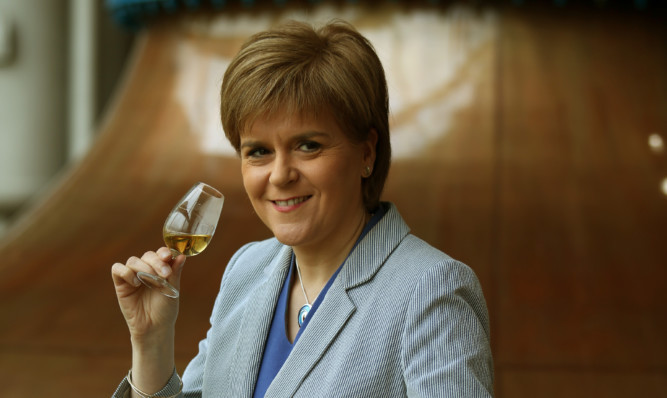Few political leaders could hope to end their first year in power by being voted the most popular person in the country, but that is exactly the feat achieved by Nicola Sturgeon with apparent ease.
As she marks 12 months in the top post on Thursday, Scotland’s first female First Minister can have the satisfaction of knowing she ranks above Andy Murray, Billy Connolly and even the Queen in the popularity stakes.
Despite a crushing defeat in last year’s referendum on Scottish independence, the SNP has surged to more than 114,000 members under her leadership and won a landslide victory north of the border in May’s general election.
Doubtless the greatest achievement of her first year in office, the securing of 56 of Scotland’s 59 Westminster seats also boosted Ms Sturgeon’s profile both at home and abroad.
From a well-received appearance on the popular US satirical news programme the Daily Show to a photoshoot in Vogue, the First Minister has become one of the best-known faces in politics.
Less than a year after the Yes campaign lost the referendum, the question of Scottish independence appears far from settled, with a vote to take Scotland out of the European Union against its will identified as one potential “trigger” for a second poll.
On the home front, however, the past 12 months have not always been an easy ride.
Ms Sturgeon has cited the deaths of Lamara Bell, 25, and John Yuill, 28, as one of the most difficult periods during her first year in office.
The couple lay undiscovered for days after a crash on the M9 near Stirling despite a sighting of their wrecked car being reported to a police control-room.
A review of police call-handing carried out after the fatal crash said “insufficient staff” had resulted in “low levels of performance”.
The single police force has come under sustained criticism after a string of controversies including the use of stop and search, armed police on routine patrols and the death in custody of Fife man Sheku Bayoh.
Critics also say not enough progress is being made on closing the gap in attainment between rich and poor pupils in Scotland’s schools, an issue on which the First Minister has staked her reputation.
In her first year, Ms Sturgeon has brought in a £100 million school attainment fund and reintroduced standardised tests in primary schools, but educationalists have questioned the Scottish Government’s ability to close the gap.
The increased pressures facing the health service, its failure to consistently meet key targets and problems at Scotland’s newest hospital in Glasgow have provided opponents a further stick with which to beat the SNP government.
In addition, the party suffered a blow when one of its newly-elected MPs, Edinburgh West’s Michelle Thomson, resigned the party whip after questions were raised about her business dealings.
Ms Sturgeon is also coming under increasing pressure to set out how she will use new powers coming to the Scottish Parliament as a result of the process of further devolution triggered by the referendum vote.
Labour has set out its proposals to use the new powers to protect Scots from the UK Government’s tax credit cuts and has called on the First Minister to do likewise.
The debate over the use of new tax and welfare powers is likely to dominate the run-up to next May’s Holyrood election, alongside policing, health and education.
At the SNP’s recent conference in Aberdeen, Ms Sturgeon’s message to Scottish voters was “judge me on my record” and her political opponents are determined to do so.
But with the polls suggesting her party is on track to win a historic third term in government, the popularity of Ms Sturgeon and her party shows no signs of abating.
